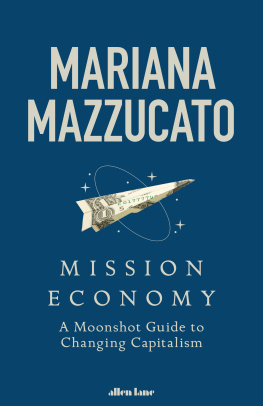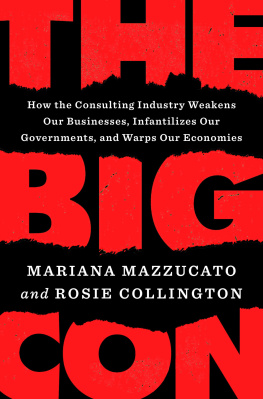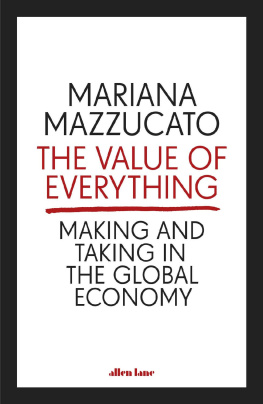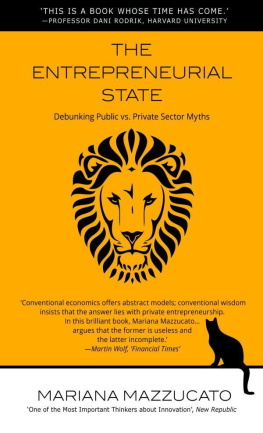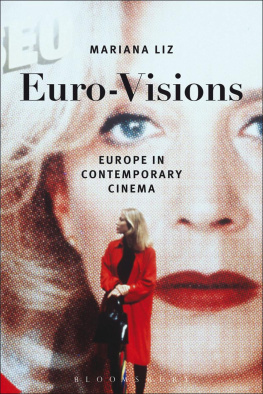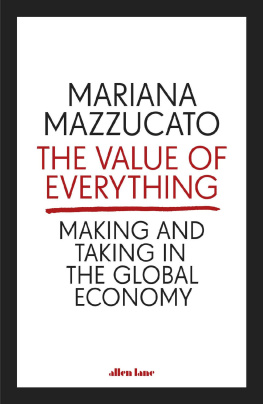Mariana Mazzucato - Mission Economy
Here you can read online Mariana Mazzucato - Mission Economy full text of the book (entire story) in english for free. Download pdf and epub, get meaning, cover and reviews about this ebook. year: 2021, publisher: Penguin Books Ltd, genre: Politics. Description of the work, (preface) as well as reviews are available. Best literature library LitArk.com created for fans of good reading and offers a wide selection of genres:
Romance novel
Science fiction
Adventure
Detective
Science
History
Home and family
Prose
Art
Politics
Computer
Non-fiction
Religion
Business
Children
Humor
Choose a favorite category and find really read worthwhile books. Enjoy immersion in the world of imagination, feel the emotions of the characters or learn something new for yourself, make an fascinating discovery.
- Book:Mission Economy
- Author:
- Publisher:Penguin Books Ltd
- Genre:
- Year:2021
- Rating:5 / 5
- Favourites:Add to favourites
- Your mark:
- 100
- 1
- 2
- 3
- 4
- 5
Mission Economy: summary, description and annotation
We offer to read an annotation, description, summary or preface (depends on what the author of the book "Mission Economy" wrote himself). If you haven't found the necessary information about the book — write in the comments, we will try to find it.
Mission Economy — read online for free the complete book (whole text) full work
Below is the text of the book, divided by pages. System saving the place of the last page read, allows you to conveniently read the book "Mission Economy" online for free, without having to search again every time where you left off. Put a bookmark, and you can go to the page where you finished reading at any time.
Font size:
Interval:
Bookmark:

PENGUIN BOOKS
UK | USA | Canada | Ireland | Australia
New Zealand | India | South Africa
Penguin Books is part of the Penguin Random House group of companies whose addresses can be found at global.penguinrandomhouse.com.

First published by Allen Lane in 2021
Copyright Mariana Mazzucato, 2021
The moral right of the author has been asserted
Cover design: Jim Stoddart
ISBN: 978-0-241-41974-8
This ebook is copyright material and must not be copied, reproduced, transferred, distributed, leased, licensed or publicly performed or used in any way except as specifically permitted in writing by the publishers, as allowed under the terms and conditions under which it was purchased or as strictly permitted by applicable copyright law. Any unauthorized distribution or use of this text may be a direct infringement of the authors and publishers rights and those responsible may be liable in law accordingly.
This book is dedicated to all those who fight for the common good.
: Twenty things we wouldnt have without space travel
: Cost comparison of major US government expenditures
: Private-sector investments for Apollo launch vehicles
: Seventeen UN Sustainable Development Goals
: A mission map
: Five mission areas selected by the EU (and interconnections)
: A mission map for Climate Action (SDG 13)
: A mission map for Life below Water (SDG 14)
: A mission map for the Future of Mobility
: A mission map for Healthy Ageing
: A mission map for Dementia
: A mission map for the Digital Divide
: Selected technologies enabled by the NASA Apollo programme
: The cost of the Apollo programme 19601973
: Market failure vs. market shaping
: Dynamic evaluation of public investment: a market-shaping view
Over the past several years, I have been lucky to work with policymakers who have interacted with me on many of the ideas in this book. The book is very much dedicated to them.
My ambition to rethink capitalism through rethinking the state began about a decade ago, when I started bringing together leaders from public organizations across the world to learn from each other specifically, to better understand how to step outside the comfort zone of fixing market failures and into the ambitious, risk-taking world of making and shaping markets. These include leaders from organizations such as the Defense Advanced Research Projects Agency, Advanced Research Projects Agency Energy, National Institutes of Health and NASA in the USA; the European Commission (EC) and the European Space Agency, the BBC, Government Digital Services and Innovate UK in the UK; the Chief Scientific Officer of Israel and Yozma in Israel; Vinnova in Sweden; Sitra in Finland; and different public banks like the KfW in Germany and BNDES in Brazil. What I found in all of my conversations with them was a real desire and thirst for a new framing of what public policy was about. It became clear that overcoming major technological and social challenges required a bold portfolio approach, a redesigning of tools like procurement and a proper economic theory to confront the directionality of growth head on. Engagement with them has enriched my understanding of the complexities of the real world enormously.
My work also led me to set up the Institute for Innovation and Public Purpose (IIPP) at University College London (UCL). The objective was to replace a bilateral relationship with public organizations with a platform that could systematically explore how to do government differently. At IIPP, my team and I are writing a new curriculum based on the premise that civil servants are not just market fixers but value co-creators and shapers. We are actively exploring questions such as: what value is being created, and is it good for people and the planet? How can we measure public value? What new participatory structures are needed to create an inclusive process while taking direction from democratically legitimate priorities, such as a green deal or a new way to understand the welfare state? We have worked with policymakers worldwide on transformative projects that inform our teaching and research and vice versa such as setting up a public bank in Scotland, rethinking innovation policy tools for the EC, and developing a carbon-neutral policy for the city of Manchester. Indeed, a siloed approach to academia has no place in learning how to do government differently. My thanks also to the senior leadership team across UCL: Provost Michael Arthur, David Price (Vice Provost for Research), and Alan Penn (ex-Dean of the Bartlett faculty) who together not only hired me but also let me structure IIPP in a way that gives policy and practice as much weight as teaching and research, with the feedback between them our key goal.
I would also like to thank several leaders from the policy world who have worked diligently with me over the years and informed many of the insights in this book. This list includes Carlos Moedas, ex-commissioner for Directorate-General for Research, Science and Innovation in the EC, and who chose me as a personal advisor. Together with his team we managed to bring a missions instrument to EC legislation (a story I tell in ). It also includes Nicola Sturgeon, First Minister of Scotland, who trusted me to work with her team to design a new mission-oriented public bank. It includes Greg Clarke in his role as Secretary of State for the Department of Business, Energy and Industrial Strategy in the UK government, who listened to me talk endlessly about why industrial strategy should not be sector-focused but challenge-focused and then asked me to set up a commission on Mission-oriented Industrial Strategy, which I co-chaired with Lord Willetts (David) a collaborator full of wisdom since his days as Minister of State for Universities and Science. Finally, it includes policymakers with whom I have recently started working closely: Cyril Ramaphosa, the President of South Africa, whose country faces great challenges, including those around state capacity, but whose energy and interest in new modes of economic models is as engaging as it is challenging; Giuseppe Conte, Italys Prime Minister, who, in choosing me as a special advisor, allowed me to help structure Italys post-COVID recovery plan using the missions approach as a framework for addressing the countrys challenges around climate, health and digitalization; and Georgia Gould, leader of Camden Council, London, with whom I am embarking on a new adventure, the Camden Renewal Commission. The commission aims to use the missions approach to bring new participatory processes and governance models to Camden Councils economic plan. One member of the Commission, George Mpanga (otherwise known as George the Poet), has provided particular inspiration for me in the last year through his quest to make sure that big ideas about reforming our dysfunctional and unequal economy are nested in new forms of storytelling.
I would also like to thank Fr Augusto Zampini, who led the Vaticans post-COVID task force, and who, along with Pope Francis, has taught me much about the urgent need for a common good approach in economics.
I should note that the risk of working so closely with policymakers is that sometimes your ideas get misinterpreted or are implemented incorrectly. As long as this is a learning-by-doing process, that is fine. Indeed, this book aims to help governments see themselves as learning organizations. I would like to thank my colleagues who read drafts of the book some in its entirety, others helping with sections and provided incredibly useful comments. These include my long-time mentor Carlota Perez (reminding me never to forget the big picture!), and the following colleagues in alphabetical order: Antonio Andreoni, Guendalina Anzolin, Rosie Collington, Brian Collins, Rowan Conway, George Dibb, Ryan Farrell, David Frayman, Simone Gasperin, Dan Hill, Rainer Kattel, Katie Kedward, Henry Li, Laurie Macfarlane, Giulio Quaggiotto, Josh Ryan-Collins and Asker Voldsgaard. I am also deeply grateful for the in-depth comments on the draft from Patrick Besha, Senior Policy Advisor at NASA and Robert Schroder from the EC.
Font size:
Interval:
Bookmark:
Similar books «Mission Economy»
Look at similar books to Mission Economy. We have selected literature similar in name and meaning in the hope of providing readers with more options to find new, interesting, not yet read works.
Discussion, reviews of the book Mission Economy and just readers' own opinions. Leave your comments, write what you think about the work, its meaning or the main characters. Specify what exactly you liked and what you didn't like, and why you think so.

